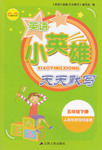题目内容
【题目】—I really think Johnson’s character is as good as that of Fang Yifan, a Senior 3 student in the TV play Xiao Huanxi.
—________. He often holds a positive attitude towards anything in life.
A.That’s not the pointB.You can say that again
C.It counts for nothingD.It doesn’t matter
【答案】B
【解析】
考查习惯表达。句意:——我觉得Johnson的性格和方一凡——电视剧《小欢喜》里的一个高三学生——的性格很像。——你说的非常正确,他对生活中的任何事情都持积极的态度。A. That’s not the point这不是重点;B. You can say that again你说的没错;C. It counts for nothing它毫无价值;D. It doesn’t matter不重要。结合语境可知,此处用“你说的没错”符合语境,故选B项。

练习册系列答案
 英语小英雄天天默写系列答案
英语小英雄天天默写系列答案 暑假作业安徽少年儿童出版社系列答案
暑假作业安徽少年儿童出版社系列答案
相关题目